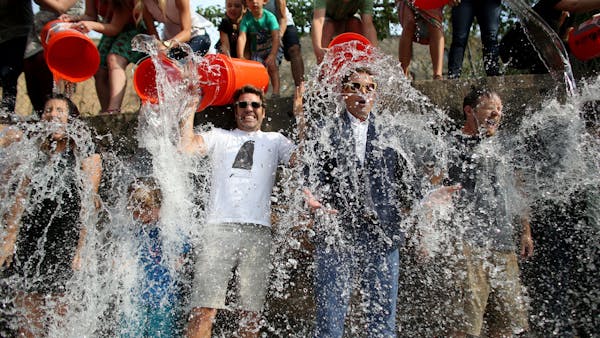The Newark, N.J., Roman Catholic Archdiocese has told pastors and Catholic school officials that holding Ice Bucket Challenges — the popular fad that has raised millions of dollars to combat a crippling illness ALS — conflicts with church teachings by funding embryonic stem-cell research.
The warning was issued in a letter from a church official and with the blessing of Archbishop John J. Myers. It said some of the research funded by the ALS Association, which receives much of the money from the Ice Bucket Challenge, involves embryonic stem-cell research, which is opposed by the Catholic Church because of conflicts with its stance against abortion.
The challenge involves dumping ice water on participants' heads and donating money for research into amyotrophic lateral sclerosis, also known as Lou Gehrig's disease. The Rev. Lawrence Fama, director of the archdiocesan Office of Respect Life, called the challenge "a stunt" that can be "fun and engaging," but questioned whether the practice conflicts with "Catholic moral teaching."
Newark is one of just a few dioceses across the nation that have issued advisories about the Ice Bucket Challenge, which has become a social media sensation.
The archdiocese sent the letter Thursday to principals at all 94 Catholic schools in the archdiocese, and to pastors and religious education staff at 218 parishes. It suggested sending donations to organizations that don't use embryonic stem-cell research.
The ALS Association responded to the warnings with a statement saying it primarily funds adult stem-cell research, which is not opposed by the Catholic Church. The statement went on to say that the association is funding one study that uses embryonic stem cells, and that research is funded by "one specific donor who is committed to this area of research."
"In fact, donors may stipulate that their funds not be invested in this study or any stem-cell project," the statement said.
It was unclear what effect the archdiocese's letter would have. Catholic schools won't be back in session for another week and a half. Pastors were sent the letters for informational purposes, said archdiocesan spokesman Jim Goodness, but it's up to them to decide how or whether they will share that information with parishioners.
Embryonic stem-cell research does not rank as a major issue for most Catholics. In a 2009 Gallup survey, 63 percent of Catholics said embryonic stem-cell research was "morally acceptable."
Last September, Pope Francis said church leaders had become too focused on social issues such as same-sex marriage and abortion and had strayed from their pastoral mission of helping the poor.
Goodness said the guidance regarding donations to ALS does not conflict with the pope's message, and merely tells people to be aware of potential conflicts with Catholic teaching.
Raul Caceres, a Teaneck parishioner who has campaigned against lavish upgrades to Myers' future retirement home, said the letter is an example of the archdiocese defying the wishes of Pope Francis.
Caceres, a surgeon, said he disagrees with church teaching on the issue of embryonic stem-cell research. "I'm a doctor; how could I oppose that?" he said.
ALS attacks the nerve cells of the brain and spinal cord that control voluntary motion. The bucket challenge calls on people to post videos of having a bucket of ice dumped on their head.
